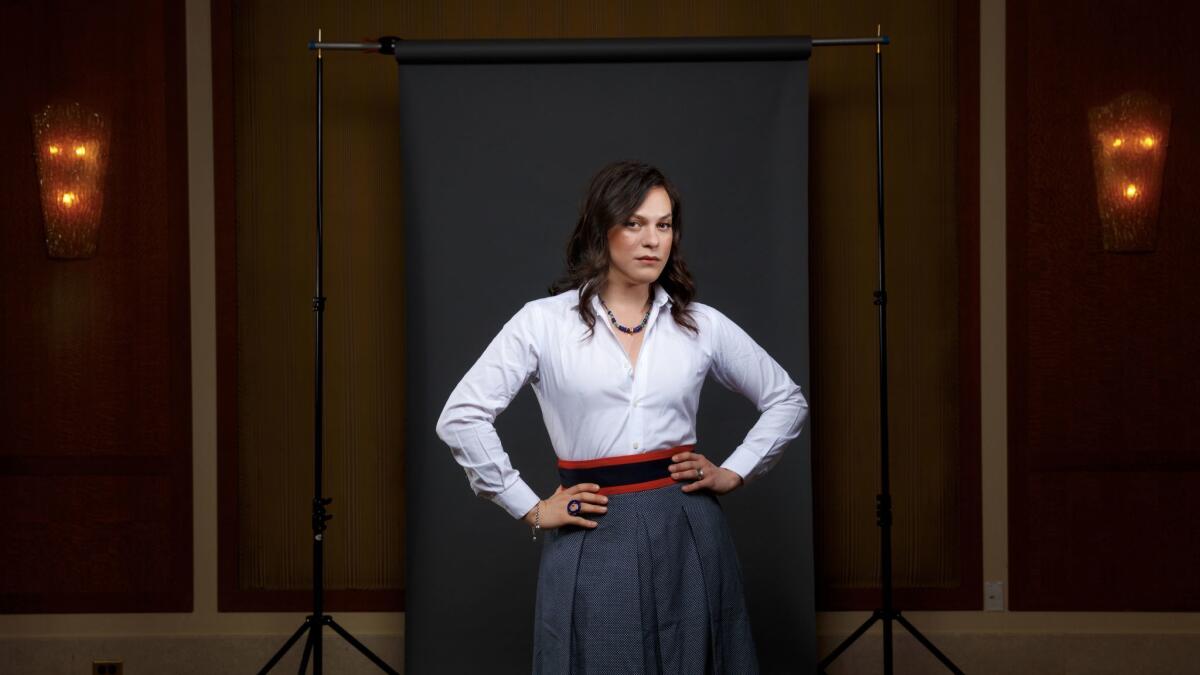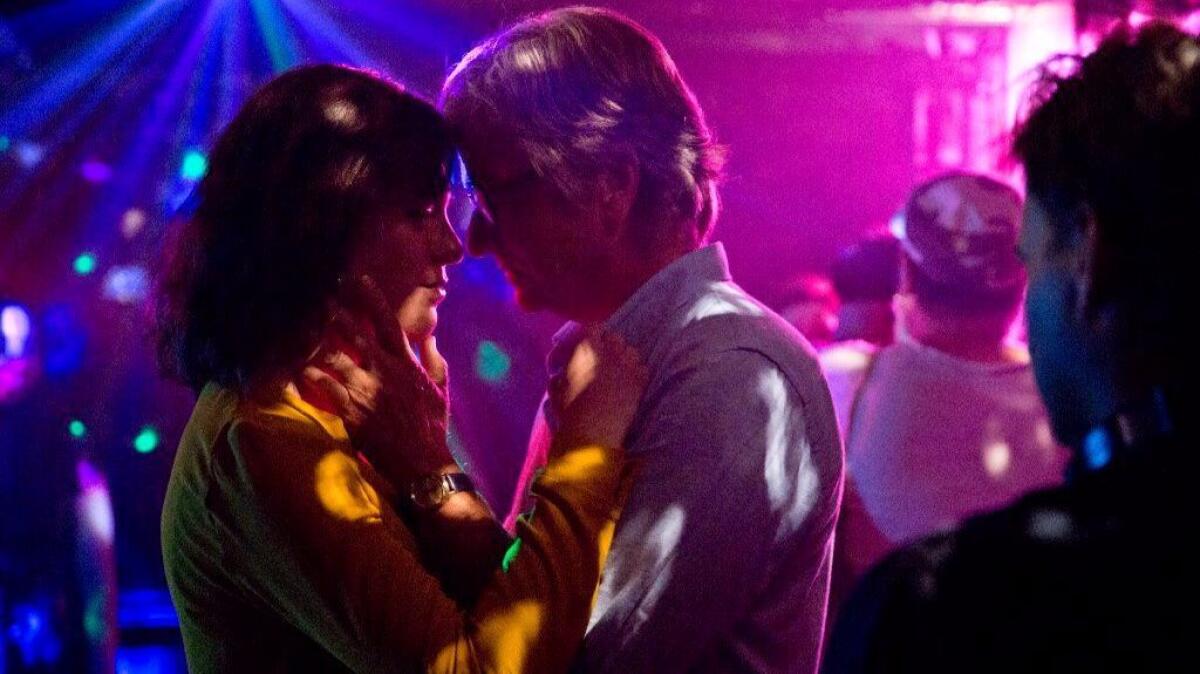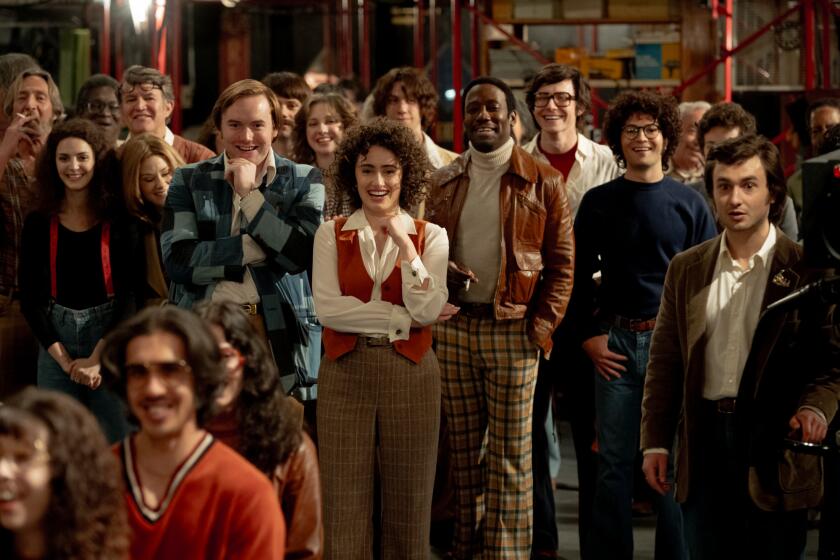Q&A: Daniela Vega, star of Oscar contender ‘A Fantastic Woman,’ on her breakout role and trans rights in Chile

By the time he completed his 2013 film “Gloria,” writer-director Sebastián Lelio knew he wanted to delve back into complex storytelling territories. He, along with longtime co-writer Gonzalo Maza, was attracted to the idea of “what would happen if the person you love dies in your arms, but your arms are bad because you're the unwanted,” he said.
Such a thought is the jumping-off point for “Una Mujer Fantástica” (A Fantastic Woman), which receives its Los Angeles premiere at AFI Fest on Monday night as part of the world cinema section.
The title character is Marina, a waitress and nightclub singer who must put her life back together after her older boyfriend dies suddenly. But because she’s a transgender woman, in a country with little to no support for trans people, she has to navigate cruelties lodged her way both by her boyfriend’s unaccepting family and the government. Newcomer Daniela Vega, who is trans, stars.
The movie premiered in February at the Berlin International Film Festival, where it won the Silver Bear and Teddy awards, and it was recently selected as Chile’s Oscar contender for foreign language film. In addition to the AFI screenings, “A Fantastic Woman” will receive a one-week Oscar qualifying run beginning Friday, before returning to theaters early next year.
To ensure Marina’s story was crafted authentically, Lelio began searching for a “cultural consultant” to bring him up to speed on the experiences of trans people in Santiago, Chile, as he had been living in Berlin for some time. A mutual friend put him in contact with Vega, who had been acting in local theater. After their initial conversation, Lelio said he knew then that a trans woman needed to play the lead character he wanted to create.
After a year of consultations through Skype, “I realized I wanted Daniela to be Marina,” Lelio said.
She accepted the role three days after being asked.
Ahead of “A Fantastic Woman's” AFI bow, The Times spoke with Vega about her breakout role, trans rights in her home country and what it means to star in an Oscar contender.
Have you always wanted to be an actress?
My main concern was becoming the woman I always wanted to be. Then I transitioned at 17 years old, graduated from high school and couldn’t find a job. I was depressed for a year, staying in bed.
My family was concerned, and my dad put me in [cosmetology] school. That’s how I started to get into the artistic world, and then a friend encouraged me take a theater class to get out of the dark place that I was in… I got into theater and never left. Then, I was in a play and a director was in the audience and he invited me to be in my first film.
How did you prepare for the role?
I had two different paths I could take to create the character. The first one was to look for female role models throughout history [like] Marilyn [Monroe] and Audrey [Hepburn]. The other path was to see how I could create a woman from my experiences. I decided to go with the latter. I started building and creating the character by using those female qualities that make you feel like a woman. That’s how Marina was born.

In the film, your character goes through a number of different forms of discrimination. Have you ever experienced anything similar in your real life?
There is a lot of discrimination from the government in my country because there are no laws that allow us to do a normal transition, and to do it safely. There's no public policy that supports the rights of trans people. And in universities and schools, we’re not taught what it means to be trans and how to relate to [trans people]. There was a lot of psychological violence in my life as well when I was looking for jobs. That is also part of the violence executed by the government on trans people because we should feel safe going out to look for a job.
How would you describe the overall social and political environment for trans people in Chile?
The political and social situation isn't that much different in Chile than it is [in the U.S.], in that there is a weird feeling when it comes to transgender people in general. But we have a lot to contribute in the sciences, arts and every single discipline. We’re fighting for liberty, to be heard. I see the world is trying to change fast, but in some areas, that change is being blocked.
A welcome wave of prestige gay cinema could wash up on Oscars' shores »
Were you surprised to hear Chile had selected the film to submit for Oscar consideration?
I think they're looking at it more as masterpiece of film rather than a political piece.
Are there other trans actors in Chile?
I’m the only one, the first.
How does that feel?
Triste. It feels sad. But I think the bigger question we have to ask is why there aren’t more trans people in other disciplines, as teachers and journalists and scientists, in the world.
Is it difficult being the first?
Instead of difficult, I’d say it’s weird. Because we’ve been able to build the pyramids and go to the moon, and we have not been able to live well on this freaking planet. So, what can I tell you?
What advice do you have for other trans people in the industry?
I would like more trans people to take their own path. And those of us that have been paving the way for others and opening doors, we need to continue to keep those doors open for the next generation.
But a question is, why is it just now that trans individuals are starting to run next to people who have always had those opportunities to play the main roles. Why is that just happening?
What do you hope audiences take away from the film?
I hope that everybody watches the movie and sees that it’s been produced from a place of love and it’s been produced to raise a lot of questions. One of them? What is left for the next generation? A better world, or not?
Get your life! Follow me on Twitter (@TrevellAnderson) or email me: trevell.anderson@latimes.com.
ALSO
Dee Rees gave 'Mudbound' a personal touch with the help of her grandmother's journal
Why it's time Hollywood let trans voices tell, and embody, their own stories
Only good movies
Get the Indie Focus newsletter, Mark Olsen's weekly guide to the world of cinema.
You may occasionally receive promotional content from the Los Angeles Times.








